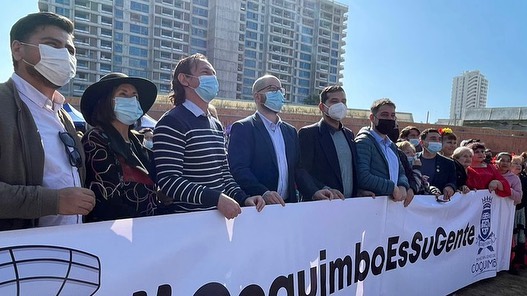The evaluation of the Chilean governments of the Concertación with results of a rich society with a per capita that reached 25,000 dollars and inequality with 50% of workers and retirees living with incomes that do not cover the expenses of the month, in a sample of inequality that was the breeding ground of the social outbreak, which produces the break of the neoliberal model imposed in dictatorship.
This marked the beginning of the construction of a new social contract, for the first time with citizen participation.
All of the above is the context in which the characterisations of politics and, in particular, of politicians and their way of proceeding in the so-called transition period take place.
The current head of the General Secretariat of the Presidency commented that, “Our scale of values and principles regarding politics not only differs from the previous government, but I believe that compared to a generation that preceded us, which could be identified with the same range of the political spectrum, such as the centre-left and the left, I believe that we are addressing issues with less euphemism and more frankness”.
The uproar and victimisation of the political class in response to this comment was not long in coming, and led the executive to its common practice in recent months of quickly apologising.
But deeper down, and beyond the desperation of the right wing in the face of the fall of the Rechazo option and their corresponding tactic of hitting the Boric government wherever they can, one can see the transversal behaviour of the professional political class, their self-referential speeches, their self-satisfied analyses and their lack of learning from their “mistakes and bad practices” in this social-political period.
It is clear that they still do not listen to the people, they do not dialogue with the people, and they degrade the testimonial opinion of the experiences of the reality that citizens have to suffer day by day.
We do not see, with honourable exceptions, a new way of doing politics, in accordance with the changes needed to implement the new Constitution, and the trend of compulsive outbursts from all the sectors in power continues, which has been characteristic and which distances people from politics and from these people who believe they can build society from their privileged circles, without incorporating the real stakeholders, the workers, the young students, the pensioners.
The social organisations have long been revealing this distancing of the political elite from social reality, condemning the “chimuchina”, the politics of the matinales and the spectacle, clamouring for this key issue to be taken up in order to leave politics behind and begin to move towards the construction of economic, social and cultural conditions for a dignified life for the people of Chile.
The change that the country needs will be with everyone, never again without the people, otherwise everything will be uphill, especially if this desperate search to regain control from the political elite continues, in order to fulfil its outdated Pinochet logic that “the rich must be looked after”.
Collaborative writing by Elizabeth Bravo, Guillermo Garcés, Cristian Inostroza, Gladys Mendoza, Silvia Hidalgo and Sandra Arriola Oporto.
Political Commission










